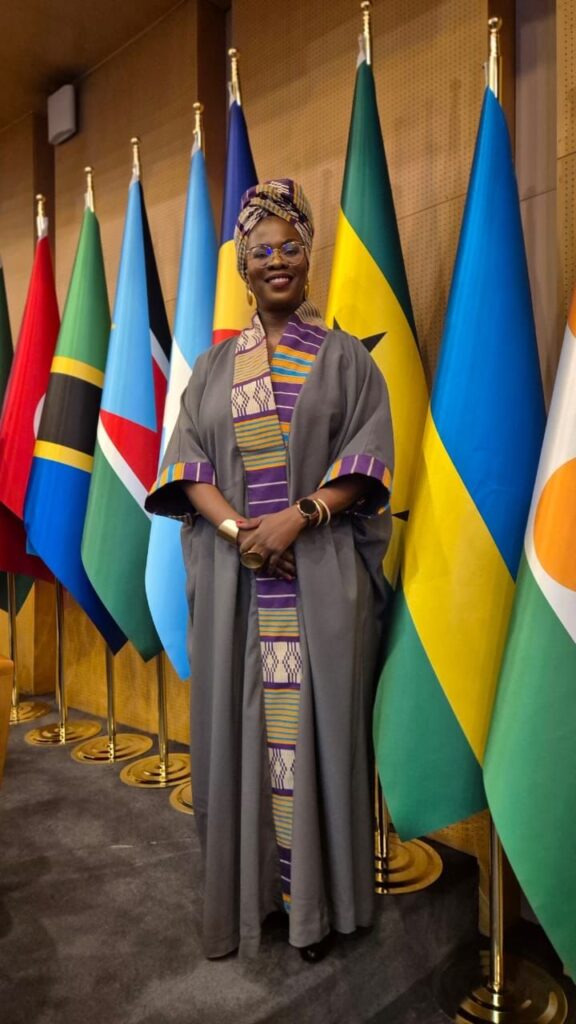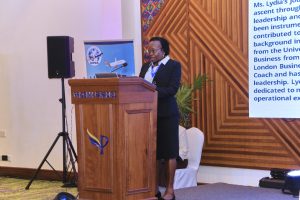Lerato Mataboge Takes the Helm as African Union Commissioner for Infrastructure and Energy

By Baboloki Semele: Lerato Dorothy Mataboge from South Africa has emerged as the African Union’s (AU) new Commissioner for Infrastructure and Energy, bringing with her over two decades of leadership in trade, investment facilitation, and policy development. As the youngest candidate to lead this pivotal role, Mataboge’s appointment signals a dynamic shift towards accelerated implementation of the African Union’s ambitious infrastructure and energy agendas. Her extensive experience, spanning from her tenure as South Africa’s Deputy Director-General for Trade and Industry to her leadership in the creation of Trade Invest Africa, positions her uniquely to drive transformative projects across the continent.
Defining the Future of Infrastructure and Energy in Africa
Mataboge’s vision for her new role focuses on reversing Africa’s historical patterns of fragmented infrastructure planning, where the continent remains a consumer of what it does not produce and a producer of what it cannot consume. Prior to her election yesterday, on her manifesto she made it clear that she aims to foster an integrated, self-sufficient Africa that fully harnesses its resources, industries, and capabilities for the benefit of its people.
One of the key aspects of her strategy she says is to build on existing AU initiatives while refining new pathways that align with the rapidly evolving global economy. Mataboge has already outlined a forward-thinking agenda centered on three strategic objectives: accelerating Africa’s industrial renaissance, accelerating Africa’s transformation, and building a capable African Union.
Advancing Africa’s Industrial Renaissance
At the core of Mataboge’s approach is the rapid scaling up of infrastructure investments across the continent. This includes critical trade-enabling infrastructure such as ports, railways, roads, energy systems, and ICT networks. Mataboge has set an ambitious goal to raise annual infrastructure spending to US$150 billion from the current US$77 billion. Achieving this target will require innovative financing mechanisms and strategic partnerships within Africa as well as with global entities.
As part of this push, Mataboge is committed to establishing Africa Inc., a coalition of African member states, Regional Economic Communities (RECs), African financiers, and private sector actors. This initiative will focus on ensuring intra-African investments that prioritize the development of the continent’s infrastructure, ICT, and energy sectors.

A Vision for Renewable Energy and Digital Transformation
Mataboge’s plan also includes the refinement of a just renewable energy masterplan for Africa. The continent is rich in energy potential, yet energy access remains a major barrier to economic development. Mataboge aims to accelerate the AU Energy Transition Programme, ensuring that it is not only sustainable but also developmental, creating new industries and technologies within Africa.
Furthermore, with the world increasingly moving towards digitalization, Mataboge emphasizes the importance of positioning Africa as a global leader in digital transformation. She aims to drive digital inclusion through the AU Digital Transformation Strategy while leveraging the continent’s mineral resources to fuel the technological advancements that will define the future. Africa’s mineral wealth is expected to play a central role in global technological innovation, and Mataboge is keen on ensuring that the continent capitalizes on this opportunity.
Revitalizing Strategic Projects: Rail and High-Speed Transport
A key element of Mataboge’s strategy is the accelerated implementation of high-priority projects like high-speed rail networks across the continent. Railways are seen as a critical component for integration, and Mataboge is focused on harmonizing rail links across Africa. In doing so, she seeks to reduce trade barriers, boost manufacturing potential, and create jobs in the rail industry.
This move is in line with the AU’s flagship project on infrastructure integration, particularly in cross-border initiatives. Mataboge recognizes rail not just as a means of transport but as a potential driver of manufacturing growth within Africa, with opportunities for local production of rail components and services that can be exported globally.
Removing Structural Barriers to Economic Growth
Another key focus area is economic inclusion, particularly for Africa’s Micro, Small, and Medium Enterprises (MSMEs), women, and youth. Mataboge says she understands that their active participation in infrastructure, green technologies, and digital transformation projects is vital for equitable growth. As part of her strategy, she will focus on removing structural barriers to economic participation, ensuring that these underrepresented groups have access to the opportunities created by Africa’s growing infrastructure projects.
Addressing the Continent’s Energy Crisis
Energy provision is a key priority for Mataboge. She has made it clear that stable, secure, and affordable energy is the foundation for Africa’s industrialization, digitalization, and decarbonization goals. To this end, she plans to accelerate energy provision to meet the demands of Africa’s rapidly growing population. The need for climate-responsive infrastructure will also be a central consideration, ensuring that energy solutions are both sustainable and equitable.
Building a Capable African Union
Mataboge’s leadership approach is not limited to infrastructure and energy; it also includes strengthening the AU’s internal capacity for coordination and effective policy implementation. By fostering collaboration both within the AU and with external stakeholders, she aims to enhance strategic alignment and improve policy delivery mechanisms. Her focus will be on cultivating a culture of accelerated implementation that can move the continent closer to realizing its vision of a united, prosperous Africa.

The Path Forward
Lerato Mataboge’s leadership in the African Union’s Infrastructure and Energy portfolio represents a new era of bold, inclusive, and sustainable development for the continent. With her expertise in infrastructure project facilitation, multilateral negotiations, and private-public partnerships, she is poised to drive Africa’s transformation into a global leader in renewable energy, industrialization, and digital innovation. As Mataboge sets out to fulfill her mandate, her vision of an integrated Africa that produces and consumes within its borders is rapidly becoming a guiding force for the continent’s future.
About Infrastructure and Energy
The Department of Infrastructure and Energy (DIE) the implementation of Agenda 2063 infrastructure programmes as well as the AU’s activities aimed at promoting, coordinating, implementing and monitoring programmes and policies on infrastructure development, transport, energy resources, information communications technology (ICT) as well as postal services and tourism at the regional and continental levels.
DIE also facilitates private sector initiatives on infrastructure development and advocating among development partners for programme implementation.
The department is in charge of the following key Agenda 2063 projects: the Single African Air Transport Market (SAATM), the Pan African e-Network (PAeN), the Integrated High Train Network, Grand Inga Dam, and Cyber Security.
DIE oversees the Programme for Infrastructure Development in Africa (PIDA), and its strategic framework, the Institutional Architecture for Infrastructure Development in Africa (IAIDA),





